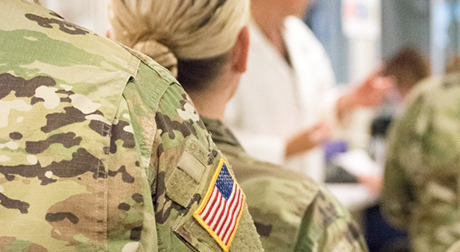Innovative Research
 Cooper is at the forefront of driving and delivering scientific and technological innovation which will benefit the U.S. Armed Forces. Led by Spencer A. Brown, PhD, Research Director, Department of Surgery, Cooper’s research initiatives strive to develop and advance technologies that will improve the standard of care among the U.S. Armed Forces as well as civilians.
Cooper is at the forefront of driving and delivering scientific and technological innovation which will benefit the U.S. Armed Forces. Led by Spencer A. Brown, PhD, Research Director, Department of Surgery, Cooper’s research initiatives strive to develop and advance technologies that will improve the standard of care among the U.S. Armed Forces as well as civilians.
Cooper’s military clinical training program will benefit directly from these medical advancements, as established algorithms and procedures are taught to non-trauma trained military personnel. Due to Cooper’s unique experience in training all branches of the Special Forces medical teams, critical insight is taught to save lives in combat situations.
Cooper’s translational research group is working in several exciting trauma-related research areas, including:
- Revisiting the need for massive amounts of fluids to resuscitate patients who have lost a substantial amount of blood.
Hemorrhage is a major cause of preventable death following military and civilian trauma. While current options to restore fluids include whole blood or other solutions, Cooper is reexamining treatment algorithms and the use of biomaterials and potential fluids to keep people alive longer. Cooper is also looking into technology that has the potential to save lives in multiple trauma-related hemorrhaging circumstances. - Prolong the life of a patient for 48 to 72 hours in the absence of a military medical unit.
Situations arise where military wounded may not be able to be extracted from a field situation in a timely manner, and need medical support before they are hospitalized and treated. Cooper’s trauma group is exploring new treatments and new biomaterials and techniques to accomplish this within the confines of limited resources, just as the military medical teams would be faced with in the field. - Provide a novel approach to septic shock treatment utilizing cell-based therapies.
There are very few treatment options for this fast-moving disorder in trauma and non-trauma cases. Cooper’s research group is exploring the potential of using a preparation from one’s own fat-derived stem cells to stabilize the vasculature (arrangement of blood vessels in the body) in order to buy more time. This will allow life-saving surgical efforts.
